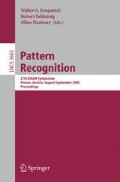Abstract
A new methodology for the determination and correction of lens distortion in fringe projection systems for 3D object measurement is introduced. The calibration of the distortion is performed in the device ready for measurement based on the simultaneous determination of both projector and (remaining) camera distortion. The application of the algorithm allows a reduction of distortion errors up to 0.02 pixels in the projector chip and also in the camera chip.
Access this chapter
Tax calculation will be finalised at checkout
Purchases are for personal use only
Preview
Unable to display preview. Download preview PDF.
References
Kruck, E.: BINGO-F Benutzerhandbuch. Ges. f. Industriephotogramm. mbH, Aalen (1995)
Brown, D.C.: Close-range camera calibration. Photogram. Eng. 37(8), 855–866 (1971)
Luhmann, T.: Nahbereichsphotogrammetrie. Wichmann Verlag (2003)
Weng, J., Cohen, P., Herniou, M.: Camera calibration with distortion models and accuracy evaluation. PAMI(14) 11, 965–980 (1992)
Kruck, E.: Lösung großer Gleichungssysteme für photogrammetrische Blockausgleichungen mit erweitertem funktionalem Modell. Dissertation, Wiss. Arbeiten der Fachrichtung Vermessungswesen der Universität Hannover, Nr. 128 (1983)
Brakhage, P., Notni, G., Kowarschik, R.: Image aberrations in optical three-dimensional measurement systems with fringe projection. Applied Optics 43(16), 3217–3223 (2004)
Chen, M., Frankowski, G.: Kalibrierstrategie für optische 3D-Koordinatenmessgeräte, basierend auf streifenprojektionstechnischen und fotogrammetrischen Algorithmen. Technisches Messen 69, Oldenbourg, 240-250 (2002)
Bräuer-Burchardt, C.: A simple new method for precise lens distortion correction of low cost camera systems. In: Rasmussen, C.E., Bülthoff, H.H., Schölkopf, B., Giese, M.A. (eds.) DAGM 2004. LNCS, vol. 3175, pp. 570–577. Springer, Heidelberg (2004)
Notni, G., Kühmstedt, P., Heinze, M., Himmelreich, M.: Phasogrammetrische 3D-Messsysteme und deren Anwendung zur Rundumvermessung. In: Luhmann, T. (ed.) Optische 3D-Messtechnik, pp. 21–32. Wichmann-Verlag (2003)
Schreiber, W., Notni, G.: Theory and arrangements of self-calibrating whole-body three-dimensional measurement systems using fringe projection techniques. Opt. Eng. 39, 159–169 (2000)
Author information
Authors and Affiliations
Editor information
Editors and Affiliations
Rights and permissions
Copyright information
© 2005 Springer-Verlag Berlin Heidelberg
About this paper
Cite this paper
Bräuer-Burchardt, C. (2005). A New Methodology for Determination and Correction of Lens Distortion in 3D Measuring Systems Using Fringe Projection. In: Kropatsch, W.G., Sablatnig, R., Hanbury, A. (eds) Pattern Recognition. DAGM 2005. Lecture Notes in Computer Science, vol 3663. Springer, Berlin, Heidelberg. https://doi.org/10.1007/11550518_25
Download citation
DOI: https://doi.org/10.1007/11550518_25
Publisher Name: Springer, Berlin, Heidelberg
Print ISBN: 978-3-540-28703-2
Online ISBN: 978-3-540-31942-9
eBook Packages: Computer ScienceComputer Science (R0)

